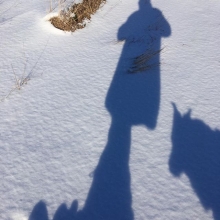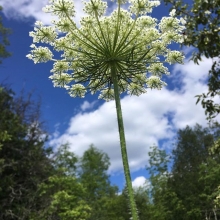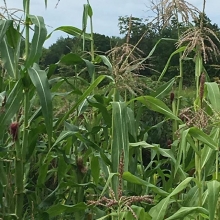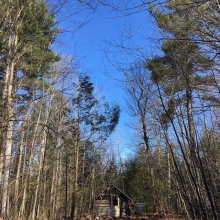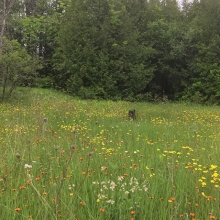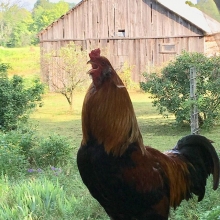Why me?
As someone who is interested in education, and who identifies as a ‘treaty person,’ I often ask myself, ‘what actions can I take in my life to be a responsible treaty partner to Indigenous people, in particular the Michi Saagiig Anishnaabe people who are original to the land I live and work on?’ My response to this question is to assist my community in transforming the educational system so that Indigenous knowledge has a place at the table along with western knowledge. In a transformed education system I believe Indigenous students would have a better chance of having their needs met in the classroom, and educators would recognize the value of Indigenous Knowledge in the midst of the anthropocene.
To help articulate one of the reasons I feel responsibility toward...
Goals of my research on Indigenous/Settler Relations in Early Childhood Education
What is the anthropocene exactly?
Reconciliation in Education
One of the questions I have been exploring is whether education can play a transformative role in treaty relationships. If it can, what might this look like? Is there sometimes a need for segregated spaces so Indigenous children have access to the knowledge holders and Elders without having to worry about knowledge that can be shared more widely and knowledge that belongs within a community? One of my educators/mentors, Nicole Bell believes that “the time has come for all nations to share their knowledge for the good of the planet that we all share. The teachings of the Anishnaabe people have insights to offer the discourse and practice of environmental sustainability” (2013, p. 89). I envision a setting where children from different nations can learn from and with each other, but...
Moving Forward in Treaty Relationships in Education
Meaningful efforts to engage in this work at the provincial and federal level are emerging slowly within settler populations. “Indigenous people and the Canadian government are only in their infancy in terms of healing this catastrophic attempt at cultural genocide so it is understandable that cooperation in the development of educational resources for a Native Studies curriculum is also in its infancy. This is where the educational system came from, and there are many challenges that lie ahead” (Ryan, Van Every, Steele, McDonald in Kulnieks, Longboat & Young, 2013, p. 24). Discussions regarding the ongoing impacts of colonialism that continue to negatively disadvantage Indigenous communities and building and sustaining respectful treaty relationships have only recently begun to emerge in the Early Years sector. As a result, many educators who did...
Stewardship vs. Kinship
Parts of this segment are from the full version of an article I wrote called: Theorizing a policy ecosystem for licensed childcare forest school within the anthropocene (unpublished). Since it was written for my Masters in Educational Studies, it may come across as slightly more academic in tone than the other posts in my blog. I hope it raises interesting points for discussion, and educators will find it to be a useful framing of children and educators living in the anthropocene.
For decades environmental educators have grappled with how to educate the next generation to address the loss of biodiversity and increasing toxicity of the environment based on human activity. Now, some are drawing attention to the Anthropocene as an opportunity to acknowledge that the way we have...
Place-Based Education
For decades educators have been grappling with how to transform the education system away from one that upholds relationships of oppression and power into one that is more liberatory. One example of engaged, transformative pedagogy is place-based learning. Developing a connection to place is a good way of helping people to develop feelings of responsibility and respectful relationships (Evering and Longboat, 2013, p. 249). Many people feel a sense of connectedness with the natural world, so exposing them to nature is a good place to start. Many settler parents and educators conduct place-based programs seeking opportunities for their children to learn about land-based survival skills, experience opportunities for ‘risky play’ and enhanced development of motor skills, or for some, to find the spiritual connection to land that they themselves crave...
Land-Based Education
While place-based education (see blog post Place-Based Education) attempts to educate children about the place they are learning, land-based education attempts to situate children within the place and land they are on. This allows children to develop relationships through understanding history and acknowledging their interconnectedness, and therefore their impact on the land. Dozens of Indigenous educators and scholars have addressed the need for decolonial approaches to education rather than trying to re-envision the mainstream education system that is rooted in Western ideology. One important consideration is to not treat ‘decolonization’ as a metaphor, but a tangible concept leading to concrete action. (For more, see Tuck & Yang’s article).
There are numerous examples of Indigenous-run programs that have modeled themselves on a holistic approach to education, often including...
Whose Land is it Anyway?
I would be remiss in my work to not bring up the elephant in the room – land repatriation.
The work of reconciliation and decolonization must include a land component, or else it will be missing a huge piece of the trauma that has unfolded through colonization. The concept of ownership of land is what has led to so many people being/feeling displaced, including through colonialism. Ultimately, ownership and exploitation of resources has led to the anthropocene, highlighting the importance of a shift away from ownership, control, and even stewardship (versus kinship – see blog post ‘Stewardship vs. Kinship’). In order for reconciliation and resurgence to unfold, many people point to the need for giving back – or repatriating some of the stolen lands in our country. This...

